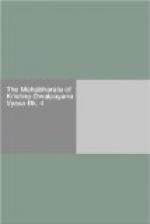Thou art the only female in the universe that possessest
the attribute of purity. Thou art decked with
a pair of well-made ears graced with excellent rings.
O Goddess, thou shinest with a face that challengeth
the moon in beauty. With an excellent diadem
and beautiful braid with robes made of the bodies
of snakes, and with also the brilliant girdle round
thy hips, thou shinest like the Mandara mountain encircled
with snakes. Thou shinest also with peacock-plumes
standing erect on thy head, and thou hast sanctified
the celestial regions by adopting the vow of perpetual
maiden-hood. It is for this, O thou that hast
slain the Mahishasura,[9] that thou art praised
and worshipped by the gods for the protection of the
three worlds. O thou foremost of all deities,
extend to me thy grace, show me thy mercy, and be thou
the source of blessings to me. Thou art Jaya
and Vijaya, and it is thou that givest victory
in battle. Grant me victory, O Goddess, and give
me boons also at this hour of distress. Thy eternal
abode is on Vindhya—that foremost of mountains.
O Kali, O Kali, thou art the great Kali,
ever fond of wine and meat and animal sacrifice.
Capable of going everywhere at will, and bestowing
boons on thy devotees, thou art ever followed in thy
journeys by Brahma and the other gods. By them
that call upon thee for the relief of their burdens,
and by them also that bow to thee at daybreak on Earth,
there is nothing that cannot be attained in respect
either of offspring or wealth. And because thou
rescuest people from difficulties whether when they
are afflicted in the wilderness or sinking in the
great ocean, it is for this that thou art called Durga[10]
by all. Thou art the sole refuge of men when attacked
by robbers or while afflicted in crossing streams
and seas or in wilderness and forests. Those
men that remember thee are never prostrated, O great
Goddess. Thou art Fame, thou art Prosperity, thou
art Steadiness, thou art Success; thou art the Wife,
thou art men’s Offspring, thou art Knowledge,
and thou art the Intellect. Thou art the two Twilights,
the Night Sleep, Light—both solar and lunar,
Beauty, Forgiveness, Mercy, and every other thing.
Thou dispellest, worshipped by the devotees their
fetters, ignorance, loss of children and loss of wealth,
disease, death, and fear. I, who have been deprived
of my kingdom, seek thy protection. And as I
bow to thee with bended head, O Supreme Goddess, grant
me protection, O thou of eyes like lotus leaves.
And be thou as boon-giving Truth unto us that are
acting according to Truth. And, O Durga, kind
as thou art unto all that seek thy protection, and
affectionate unto all thy devotees, grant me protection!’”
[9] Mahishasura, the son of Rambhasura. Durga had to fight for many years before she could slay this formidable Asura. The story occurs in the Markandeya Purana. To this day, Bengal during the great Durga Puja festival in autumn, worships the goddess with great veneration.
[10] Literally, one that rescues from difficulty.




